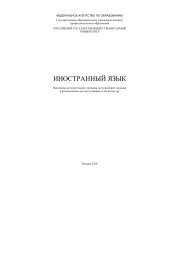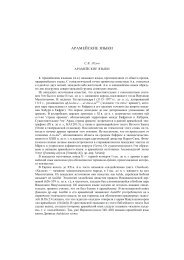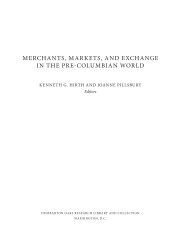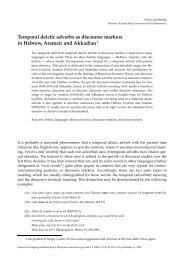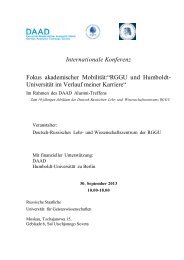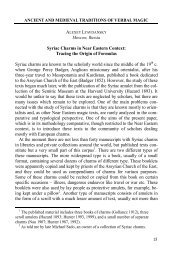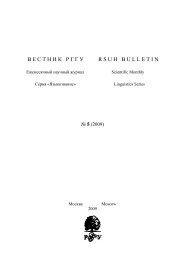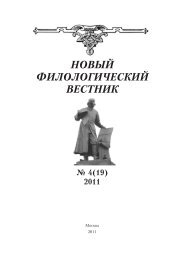Akkadian Sentences about the Present Time (II/2)
Akkadian Sentences about the Present Time (II/2)
Akkadian Sentences about the Present Time (II/2)
Create successful ePaper yourself
Turn your PDF publications into a flip-book with our unique Google optimized e-Paper software.
774 Morphosyntax and Text Structure in <strong>Akkadian</strong>in <strong>the</strong> sense ‘he holds, he is carrying/bringing, he has.’ 37 As all predicativeadjectives, <strong>the</strong>se participles take phonologically reduced post-positivesubject pronouns of <strong>the</strong> 1st and 2nd persons: b-ī¯ay ¢"īn-nā ‘I hold (it) inmy hands.’ 38 It is also worth notice that leqûm and maārum display <strong>the</strong>irfamous productive “Haben” A readings of <strong>the</strong> SC in OB, but not in OA.A natural explanation will be that <strong>the</strong>se are technical usages of law andbusiness that developed within OB. In business OA, <strong>the</strong> correspondingsenses must have been expressed by different exponents.VA marum ‘received.’(45) mâtum ‘to die’The SC is common in both OB and OA; it is better attested in OA, andoften appears in <strong>the</strong> syntactic slots of <strong>the</strong> Perf. or Pret., 39 while a purelyresultative usage of mēt is also well known in OA (unlike that of <strong>the</strong> SC Pof dâkum in <strong>the</strong> whole of our corpus): ANŠE.ÚI.ru-kà me-tù ‘Deine Esel sindtot’ (Prag I 426:11), 1 ANŠE me-et (ibid. 22), and passim in <strong>the</strong> accounts ofgains and losses. Death of humans is often reported in <strong>the</strong> same way, e. g.PN me-et ší-im-tù-šu ú-lá i-ší-im ‘PN has died without having left his lastwill’ (BIN 6, 2:3ff.), lā libbi ilim-ma aššitī me-ta-at ‘alas, my wife has died’(TCL 4, 30:4); cf. same kind of usage in a conditional clause: šummamin meta-ku‘if I had died/if I were dead’ (TCL 19, 32:30). An instance of <strong>the</strong> SC ina typically preterital slot: ½ TÚG i-nu-mì DUMU.MUNUS-sú me-ta-at-ni a-naPN ú-šé-bi 4 -il 5 ‘½ Stoff habe ich, nachdem seine Tochter gestorben war, zuPN geschickt’ (BIN 4, 141 = Ulshöfer 1995, No. 397:143), and see alsoe. g. KUG 35:8, Prag I 648:7. Actually, <strong>the</strong> Pret. of muātum seems to be underrepresentedin OA “in favour” of <strong>the</strong> SC. The Perf. has not been foundin main clauses.In OB, unlike in OA, <strong>the</strong> t-Perf. is well attested in main clauses, it isused oftener than <strong>the</strong> Pret., and this unusual evidence might be explainedby a “middle” (or, better, “unaccusative”) lexical meaning of thisverb coupled with <strong>the</strong> etymologically “middle voice” nature of <strong>the</strong> t-Perf.37Cf. also a very telling example from Mandaic, quoted in Nöldeke 1875:381,w-ngydy-l trysar malakia ‛und 12 Engel ziehen es’ (NGD ‛to draw, to lead forth’).38See Goldenberg 1998:610 for references to <strong>the</strong> grammars of Syriac that illustratethis feature, and for parallels with Hebrew.39Mâtum is ano<strong>the</strong>r prime example of a verb with “improperly” used SC apudKouwenberg (forthcoming 7.3.3). His evidence comes from OA, MA, and SB.



